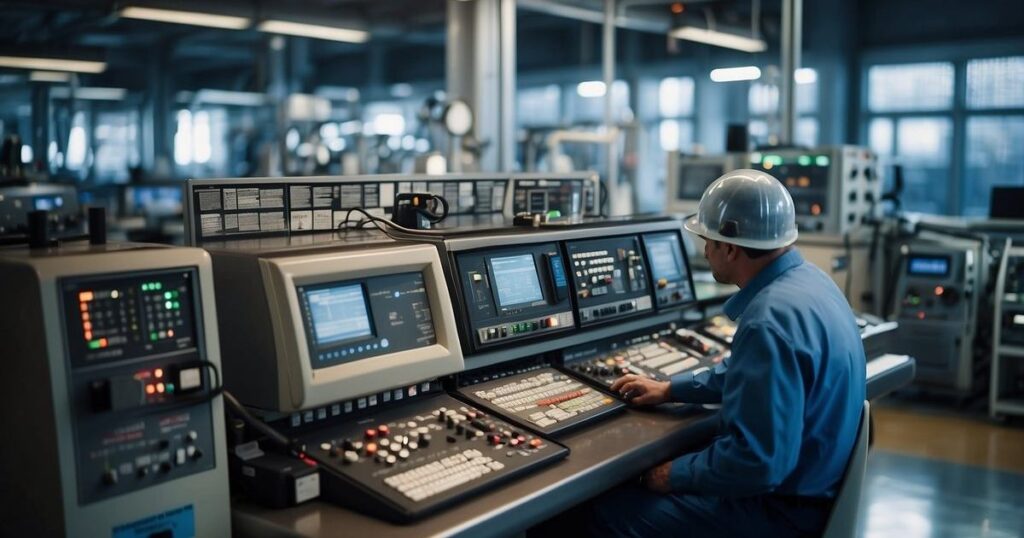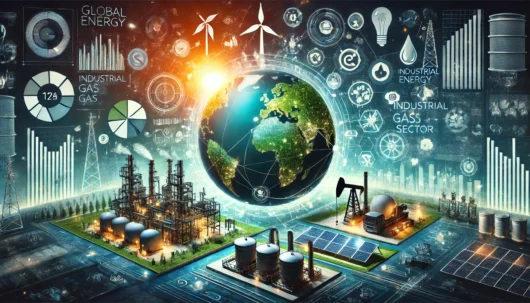In the industrial gas sector, your awareness of the relentless march of technology is crucial, leading to technological advancements in industrial gas. As you witness the landscape change, you’ll notice that the adoption of Industry 4.0 tools has significantly uplifted the capabilities of these companies. Furthermore, with increasing volumes of data and enhanced connectivity, the digital transformation is enabling the sector to deploy computing power and advanced analytics more efficiently.
Moreover, your understanding of this technological evolution is deepened by observing its practical applications. For example, artificial intelligence (AI) is not just a conceptual leap but a practical one that’s revolutionising operational dynamics within the industry. Through innovations such as ‘digital twins’ and reinforcement learning, AI is enabling industrial gas companies to optimise large-scale systems and improve decision-making processes.
Moreover, your attention to the environment is mirrored in the sector’s shift towards sustainable solutions. The emergence of ‘green hydrogen’ as a clean energy source is a testament to this shift, with industrial gas firms increasingly establishing hydrogen generation plants. This forward-thinking approach reflects a broader commitment to harnessing technology not only to improve operational efficiency but also to contribute to a sustainable future.
Advancements in Industrial Gas Technologies

As you explore the industrial gas landscape, recent technological innovations have significantly enhanced operational effectiveness, sustainability, and resource management.
Innovative Applications of Artificial Intelligence
The utilisation of artificial intelligence (AI) has revolutionised the oil and gas industry’s approach to complex challenges. Additionally, through the integration of advanced analytics and machine learning, your understanding of natural gas reserves can improve, leading to more informed decisions. AI systems now play a pivotal role in data analysis, helping to identify patterns that human operators might overlook. This translates to better risk assessment and more cost-effective resource allocation.
Enhancing Efficiency in Production and Supply Chains
Technological innovation in the value chain has optimised production and streamlined supply chains, contributing to economic improvements. In the realm of liquefied natural gas (LNG) transportation, progress in efficiency means that natural gas can be moved more effectively, reducing time and cost. Advanced analytics support operational efficiency, mitigating bottlenecks and enhancing the speed of natural gas production delivery from extraction to market.
Environmental Advancements and Energy Transition
Your industry’s environmental impact is a critical consideration, particularly in light of the Paris Agreement and the push for renewable energy. Technological advancements have enabled the oil and gas sector to reduce emissions and minimise its carbon footprint. Innovations such as carbon capture and storage technologies, combined with a shift towards the integration of renewable energy sources, are pivotal in navigating the energy transition.
Evolution of Gas Exploration and Extraction
Exploration and extraction methods have evolved significantly with technological advancements, such as the advent of fracking and the deployment of digital twins for modelling LNG processes. These techniques have enhanced the ability to access hard-to-reach natural gas reserves, altering the landscape of the industry and paving the way for more efficient natural gas production.
Implications and Strategic Considerations

This section explores how economic and geopolitical factors, regulatory frameworks, and market dynamics are integral to shaping the strategy of industrial gas companies amidst technological advancements.
Economic and Geopolitical Factors Shaping the Gas Industry
The interplay between economic growth, geopolitical relations, and energy demand significantly influences the industrial gas landscape. As nations like China and Canada strive to meet their energy needs, companies must navigate the complexities of global energy markets and oil price volatility. BP and other oil and gas companies are acutely aware that geopolitical tensions can swiftly alter the competitive landscape, making agility and foresight crucial.
Navigating Industrial and Environmental Regulations
Regulations and policies present both challenges and directions for the industrial gas sector. Stringent laws aimed at reducing carbon dioxide emissions are prompting a shift towards cleaner technologies with lower carbon intensity. Consequently, companies must invest in decarbonisation technologies and comply with environmental regulations that vary by region—ensuring that CO2 emissions align with international climate goals.
Responding to Industrial Disruptions and Market Dynamics
The industrial gas industry is not immune to disruptions. Technological advancements have been reshaping the oil and gas sector, leading to a more competitive landscape. Oil and gas companies must adapt to innovations that can transform operations and reduce environmental impacts, all while keeping an eye on the global energy demand and petrochemical markets. These dynamics, compounded by unforeseen events, require a robust response strategy to maintain market position.
By understanding these critical areas, you can anticipate the shifting paradigms within industrial gas and strategically position your operations for long-term resilience and growth.
Frequently Asked Questions
You can further enhance your understanding of technological advancements in the industrial gas industry by exploring these frequently asked questions.
What are the latest technological developments impacting the efficiency of gas production?
Recent developments include the use of Industry 4.0 technologies, such as advanced analytics, which are enabling more efficient manufacturing processes.
How is digital transformation shaping the future of the oil and gas sector?
Digital transformation in the sector is being driven by connectivity and data, using computing power to improve operations and decision-making.
In what ways are sustainable technologies being integrated into the industrial gas industry?
The industry is integrating sustainable technologies by developing lightweight composite cylinders and prioritising research in innovative solutions for improved sustainability.
What advancements have there been in safety and risk management in the oil and gas industry?
Advancements in materials technology enhance safety, and R&D investments focus on creating solutions that manage risks more effectively in the industry.
How are advancements in drilling and extraction methods revolutionising the natural gas industry?
New drilling and extraction methods have drastically improved efficiency, reduced the environmental impact, and revolutionized the production of natural gas.
What role does artificial intelligence play in optimising operations within the oil and gas field?
Artificial intelligence plays a pivotal role by enabling predictive maintenance, which optimises operations and minimises downtime in the field.


